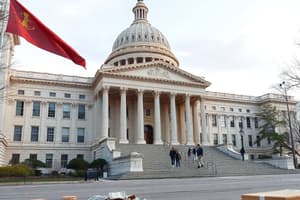Podcast
Questions and Answers
What is a defining characteristic of democracy?
What is a defining characteristic of democracy?
- Power is concentrated in a single ruler.
- Rule is by a small elite group.
- Authority is based on religious law.
- Power rests with the people through elections. (correct)
Which type of polity is ruled by a single sovereign?
Which type of polity is ruled by a single sovereign?
- Democracy
- Oligarchy
- Authoritarianism
- Monarchy (correct)
What best describes totalitarianism?
What best describes totalitarianism?
- Controlled by religious leaders.
- Rule by a small wealthy group.
- An extreme form of authoritarianism. (correct)
- Government by elected representatives.
In which polity do individuals have limited freedoms and political opposition?
In which polity do individuals have limited freedoms and political opposition?
What is an essential function of polity?
What is an essential function of polity?
Which political system emphasizes the division of power between national and regional governments?
Which political system emphasizes the division of power between national and regional governments?
What is sovereignty?
What is sovereignty?
Which type of polity is characterized by political authority derived from divine guidance?
Which type of polity is characterized by political authority derived from divine guidance?
Flashcards are hidden until you start studying
Study Notes
Definition of Polity
- Polity refers to a form or process of civil government or constitution.
- It encompasses the structure and organization of a political entity.
Types of Polities
-
Democracy:
- Power rests with the people, who elect representatives.
- Includes direct democracy and representative democracy.
-
Monarchy:
- Rule by a single sovereign; can be absolute or constitutional.
- Absolute monarchies have unchecked power, while constitutional monarchies exist within the bounds of a constitution.
-
Oligarchy:
- Rule by a small group of people, often based on wealth, family ties, or military control.
-
Authoritarianism:
- Centralized control by a single leader or party, with minimal political pluralism.
- Limited individual freedoms and political opposition.
-
Totalitarianism:
- An extreme form of authoritarianism where the state seeks to control all aspects of public and private life.
-
Theocracy:
- Rule by religious leaders or based on religious law.
- Political authority is derived from divine guidance.
Key Concepts
- Sovereignty: The ultimate authority within a territory, free from external interference.
- Legitimacy: The general belief that a government has the right to rule; crucial for stability.
- Political Culture: The set of attitudes, beliefs, and sentiments that shape the political behavior of a society.
Functions of Polity
- Establishes laws and governance structures.
- Provides order and security.
- Facilitates political participation and representation.
- Manages conflict and promotes common good.
Political Systems
- Federalism: Division of power between national and regional governments.
- Unitary System: Centralized government where local authorities derive power from the central government.
- Confederation: A union of sovereign states that delegate certain powers to a central authority.
Importance of Polity
- Shapes societal norms and values.
- Influences economic and social policies.
- Determines the means of achieving justice and equality.
Evolution of Polity
- Historically evolved from tribal systems to complex modern states.
- The rise of democracy and human rights movements has significantly impacted contemporary political structures.
Definition of Polity
- Polity is a process or form of civil government or constitution, defining the organization and structure of political entities.
Types of Polities
- Democracy: Power is held by the people who elect representatives; includes direct democracy (citizen participation) and representative democracy (officials elected to represent).
- Monarchy: Governed by a king or queen; can be absolute (unlimited power) or constitutional (limited by law).
- Oligarchy: Governed by a small group, often originating from wealth, family connections, or military control.
- Authoritarianism: Centralized leadership with minimal political pluralism, limiting freedoms and opposition.
- Totalitarianism: An extreme authoritarian regime aiming for total control over public and private life.
- Theocracy: Rule by religious leaders or institutions, where political authority is based on divine guidance.
Key Concepts
- Sovereignty: Refers to the ultimate authority within a territory, free from outside interference.
- Legitimacy: The belief in a government’s right to rule, essential for maintaining stability within the polity.
- Political Culture: Encompasses the attitudes, beliefs, and sentiments that influence political behavior in a society.
Functions of Polity
- Establishes laws and structures for governance.
- Ensures order and security within the state.
- Encourages political participation and representation of citizens.
- Manages societal conflicts and fosters the common good.
Political Systems
- Federalism: Distribution of power between national and regional governments, allowing for local governance.
- Unitary System: Centralized government structure where local authorities derive their power from the national government.
- Confederation: A union of independent states which grants certain powers to a central authority while retaining sovereignty.
Importance of Polity
- Shapes social norms and cultural values.
- Influences both economic and social policy-making.
- Determines processes for achieving justice and equality within society.
Evolution of Polity
- Transition from tribal systems to more complex modern governments.
- The emergence of democracy and human rights movements has greatly altered contemporary political frameworks.
Studying That Suits You
Use AI to generate personalized quizzes and flashcards to suit your learning preferences.




